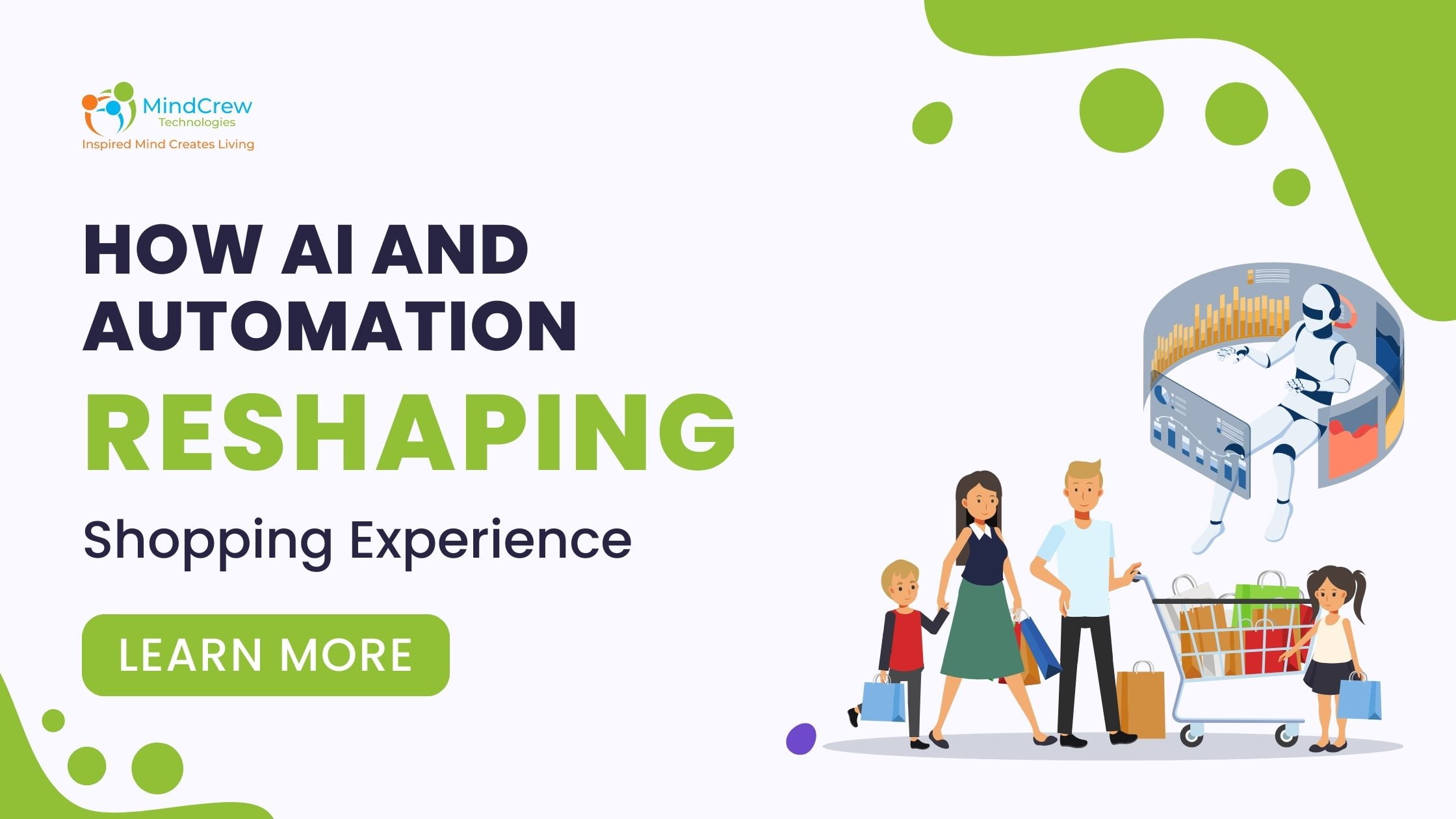How AI and Automation are Reshaping the Shopping Experience in 2023
Welcome to the retail revolution! In just a few short years, our shopping experiences will be transformed beyond imagination. Say goodbye to long queues, out-of-stock disappointments, and aimless wandering through crowded aisles. The future of retail is here, and it’s powered by the unstoppable duo: Artificial Intelligence (AI) and Automation. Get ready to dive into a world where personalised recommendations are at your fingertips, shelves restock themselves like magic, and customer service goes above and beyond your wildest expectations. Join us as we explore what lies ahead in this thrilling journey towards a smarter, more efficient shopping experience in 2023!
Introduction to the Future of Retail
The retail industry is under pressure as consumers shift their spending to online platforms. In order to compete, retailers are turning to artificial intelligence (AI) and automation technologies to improve their operations.
According to a report by Grand View Research, the global AI in the retail market is expected to reach $7.3 billion by 2025. This growth is being driven by the need for improved customer experience, increased operational efficiency, and personalization capabilities.
Some of the most common applications of AI in retail include chatbots, virtual assistants, product recommendations, and automated customer service. These technologies are helping retailers provide a better shopping experience for customers while also reducing costs.
As AI and automation technologies become more prevalent in retail, it’s important for companies to stay ahead of the curve. By investing in these technologies now, retailers can position themselves for success in the future.
The retail industry is changing rapidly, and AI and automation technologies offer retailers a way to stay competitive. With the right strategies in place, companies can use these technologies to improve their operations, customer service, and overall profitability.
The Impact of AI and Automation on the Retail Industry
The rise of artificial intelligence (AI) and automation is having a profound impact on the retail industry. Retailers are turning to AI and automation to improve operational efficiency, personalise the customer experience, and gain a competitive edge.
According to a recent study by Boston Consulting Group, AI can help retailers increase sales by up to 30 percent and improve margins by up to 10 percent. The study found that AI-enabled retailers are better able to identify customer needs and match them with the right products and services. In addition, AI can help retailers optimise pricing and promotions, as well as improve inventory management.
While there are many benefits of AI for retail, it is important to note that not all retailers are embracing AI at the same pace. Large retailers such as Amazon and Walmart are investing heavily in AI, while smaller retailers are still lagging behind. This is likely due to the fact that large retailers have more resources to invest in new technologies.
Despite the fact that not all retailers are equally invested in AI, it is clear that this technology is having a major impact on the retail industry as a whole. As AI continues to evolve, we can expect even more changes in the way that retail businesses operate.
Advantages and Disadvantages of AI and Automation in the Retail Industry
The retail industry is under pressure as consumers shift their spending to experiences over stuff. In order to stay competitive, many retailers are turning to artificial intelligence (AI) and automation. Here we take a look at the advantages and disadvantages of AI and automation in the retail industry.
Advantages:
1. Increased Efficiency: Automation can help increase efficiency in the retail sector by reducing the need for manual labour. For example, self-checkout machines can help reduce queues at the checkout counter.
2. Improved Customer Service: AI-powered chatbots can provide 24/7 customer service, helping to answer customers’ questions and resolve their issues.
3. Personalised Shopping Experiences: AI can be used to personalise the shopping experience for customers based on their past purchase history and preferences. This allows retailers to offer targeted recommendations and deals, which can lead to increased sales.
4. Reduced Costs: Automation can help reduce costs for retailers by decreasing the need for human labour. Additionally, it can help improve inventory management and minimise shrinkage (theft).
How Artificial Intelligence Can Help Improve Customer Experiences
The retail industry is under pressure like never before. With the rise of online shopping and the ubiquity of mobile devices, customers have more choices than ever before – and they expect a seamless, personalized experience every time they interact with a brand.
That’s where artificial intelligence comes in. AI can help retailers meet customer expectations by providing real-time insights, automating tasks, and powering personalization at scale. Here are some specific ways AI can improve the customer experience:
In-store navigation: Customers can use their mobile devices to get turn-by-turn directions to the products they want in physical stores. This way, they don’t have to waste time searching for items or ask for help from store employees.
Faster checkouts: Mobile apps that use AI can speed up the checkout process by automatically scanning items and applying coupons or loyalty rewards. This makes it easier and faster for customers to pay and reduces lines at the register.
Personalized recommendations: AI can analyze a shopper’s purchase history and preferences to make personalized recommendations for other products they might like. This helps shoppers discover new products they’ll love, which increases satisfaction and loyalty.
These are just a few examples of how AI can help improve customer experiences in retail settings. As AI technology continues to evolve, we can expect even more innovative applications that will further transform the retail landscape.
Strategies for Implementing AI and Automation in Retail
The retail industry is under pressure like never before. Retailers are looking for ways to cut costs, improve efficiency, and better compete with online rivals. One way they are doing this is by turning to artificial intelligence (AI) and automation. Here are some strategies for implementing AI and automation in retail:
1. Use AI for customer segmentation. Segmenting customers is a key part of any marketing strategy. AI can help retailers segment their customers more accurately, allowing them to tailor their marketing messages more effectively.
2. Use AI-powered chatbots. Chatbots are a great way to provide customer support and answer questions 24/7. They can also be used to upsell and cross-sell products and services.
3. Use AI for product recommendations. AI can be used to recommend products to customers based on their past purchase history and browsing behavior. This can help increase sales and improve customer satisfaction.
4. Automate repetitive tasks. Many retail tasks are repetitive and time-consuming, such as stocking shelves or checking inventory levels. Automating these tasks can free up employees to focus on more important tasks, such as helping customers.
5. Implement an omnichannel strategy. An omnichannel strategy is essential for success in today’s retail environment. AI can be used to personalize the shopping experience across all channels, from the website to the store to the mobile app
Challenges Faced by Businesses when Implementing AI and Automation
When it comes to implementing AI and automation into their businesses, retailers face a few challenges. The first challenge is data. In order for AI and automation to be effective, businesses need access to data that is accurate and up-to-date. This can be a challenge for retailers who have legacy systems in place that are not easily integrated with new technologies.
Another challenge facing businesses when implementing AI and automation is change management. AI and automation technologies can require significant changes to business processes and the way employees work. This can be a challenge for businesses to manage, especially if they do not have experience with these technologies.
Another challenge that businesses face when implementing AI and automation is cost. These technologies can be expensive to implement and maintain, so businesses need to carefully consider whether the benefits of AI and automation justify the costs.
Conclusion
The future of retail looks to be an exciting one, with the introduction of AI and automation set to revolutionise the way businesses operate. With these technologies in place, customers will have access to more personalised experiences than ever before while retailers can benefit from improved efficiency and cost savings. As we look ahead to 2023, it is clear that AI and automation are set to usher in a new era of shopping for everyone involved.







